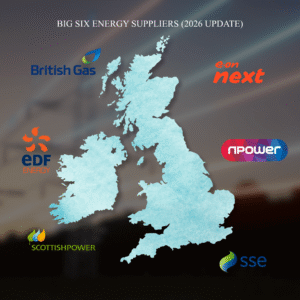
Abdullah Shoaib
Managing Director
4 min read
Last Updated Jan 17, 2024
Should I get a smart meter?
Here, we explain the benefits and rules of getting a smart meter to help clarify how they can help you run your business efficiently.
Should I get a smart meter?
Here, we explain the benefits and rules of getting a smart meter to help clarify how they can help you run your business efficiently.
Do you have to have a smart meter?
Smart meters are not compulsory – in most cases, you don’t have to have one if you don’t want to, even if you’re offered one by your supplier. You may be able to request a non-smart meter, or request that a smart meter is installed, but the ‘smart’ capabilities are switched off.
However, there are some circumstances where you might not be able to refuse a smart meter. This can happen if your current electricity meter has been installed for a long time. After several years, it will become less accurate and may no longer reflect your actual usage – meaning you might be paying for more electricity than you’ve used.
Gas meters don’t expire in the same way, but there may be a known defect with your meter type, or it may need to be replaced if damaged. If your supplier tells you that you need to have your meter replaced, you can ask for their reasoning – and if it’s not satisfactory, you can make a complaint.

It’s also worth noting that not having a smart meter may impact the tariffs available to you in the future. Suppliers sometimes offer cheaper tariffs to those who can demonstrate sustainable usage and they use smart meter data to establish this.
Is it worth getting a smart meter?
While you don’t have to have a smart meter in the UK, there are plenty of benefits to getting one installed. As mentioned, having a smart meter may help to keep you eligible for the best deals and tariffs, both for electricity and gas contracts – but the advantages don’t stop there…
Access to almost real-time data on energy usage
One of the most important benefits of having a smart meter comes from its companion device, the in-home display (IHD). This is a small monitor that gives you a visual indicator of your current and recent energy usage – available both domestically and for businesses of all sizes.
With an IHD, you can see in near real-time how much your usage spikes when, for example, you print a document. This information could help you to make usage changes – in this example, you might decide to go paperless to cut out printer and photocopier usage.
No need to receive estimate bills
When your supplier hasn’t received a meter reading, they’ll estimate how much gas or electricity you have used during the billing period by taking into account average usage. Then they’ll charge you based on this – even though you might not have used as much energy as the estimate suggests.
A smart meter removes this problem by establishing a connection between your premises and the supplier. Smart meters regularly report back to the supplier with how much energy you’ve used, helping to ensure they have the most up-to-date information at all times.
Without a smart meter, you would have to report your meter readings yourself to get accurate bills – which can be an extra, unnecessary hassle for a busy small business owner. So, getting a smart meter not only ensures your bills are more accurate, but also saves you time in the day-to-day running of your business.
Get the opportunity to join time-of-use schemes
We’ve talked about certain tariffs only being available to smart meter users, but it’s also worth knowing that having a smart meter may give you the chance to save with occasional ‘off-peak’ schemes.
Through near real-time data supplied by smart meters, suppliers can find out when people use energy the most (‘peak times’) and the least (‘off-peak times’). During peak times, there may be outages caused by an overload on the electricity system, and during off-peak periods, suppliers may have more energy than they can supply.
As well as regular off-peak schemes, there may also be sporadic, opportunistic discounts available. This usually happens when the weather is very sunny or windy, resulting in extra energy being generated by solar and wind farms, so your supplier may offer you a discount to use energy at these times.
Access to almost real-time data on energy usage
One of the most important benefits of having a smart meter comes from its companion device, the in-home display (IHD). This is a small monitor that gives you a visual indicator of your current and recent energy usage – available both domestically and for businesses of all sizes.
With an IHD, you can see in near real-time how much your usage spikes when, for example, you print a document. This information could help you to make usage changes – in this example, you might decide to go paperless to cut out printer and photocopier usage.
No need to receive estimate bills
When your supplier hasn’t received a meter reading, they’ll estimate how much gas or electricity you have used during the billing period by taking into account average usage. Then they’ll charge you based on this – even though you might not have used as much energy as the estimate suggests.
A smart meter removes this problem by establishing a connection between your premises and the supplier. Smart meters regularly report back to the supplier with how much energy you’ve used, helping to ensure they have the most up-to-date information at all times.
Without a smart meter, you would have to report your meter readings yourself to get accurate bills – which can be an extra, unnecessary hassle for a busy small business owner. So, getting a smart meter not only ensures your bills are more accurate, but also saves you time in the day-to-day running of your business.
Get the opportunity to join time-of-use schemes
We’ve talked about certain tariffs only being available to smart meter users, but it’s also worth knowing that having a smart meter may give you the chance to save with occasional ‘off-peak’ schemes.
Through near real-time data supplied by smart meters, suppliers can find out when people use energy the most (‘peak times’) and the least (‘off-peak times’). During peak times, there may be outages caused by an overload on the electricity system, and during off-peak periods, suppliers may have more energy than they can supply.
As well as regular off-peak schemes, there may also be sporadic, opportunistic discounts available. This usually happens when the weather is very sunny or windy, resulting in extra energy being generated by solar and wind farms, so your supplier may offer you a discount to use energy at these times.




